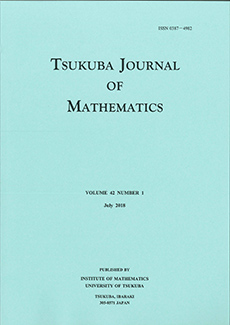Abstract
The inhomogeneous Diophantine approximation algorithm of Nishioka et al., ($X$,$T_{2},$$c(x),$$d(x,$$y)$), was shown by Komatsu to be efficient for inhomogeneous Diophantine approximation, but lacks a properly founded natural extension and not all periodic points about the approximation are determined. A new algorithm, ($X$,$T,$$a(x),$$b(x,$$y)$), is proposed in this paper as a modification of ($X$,$T_{2},$$c(x),$$d(x,$$y)$), and is shown to be efficient for inhomogeneous Diophantine approximation similar to ($X$,$T_{2},$$c(x),$$d(x,$$y)$) but also to have a natural extension, which allows all periodic points about ($X$,$T,$$a(x),$$b(x,$$y)$) to be determined and gives $\lim\inf_{q\rightarrow\infty}q||q\alpha-\beta-p|$ for the periodic points $(\alpha,\beta)$.
Citation
Shin-ichi Yasutomi. "On a new algorithm for inhomogeneous Diophantine approximation." Tsukuba J. Math. 29 (1) 173 - 195, June 2005. https://doi.org/10.21099/tkbjm/1496164898
Information





